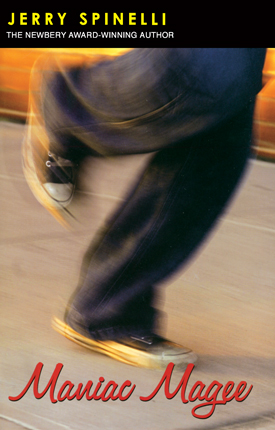| Maniac Magee : a novel Author: Spinelli, Jerry | ||
| Price: $6.50 | ||
Summary:
After his parents die, Jeffrey Lionel Magee's life becomes legendary, as he accomplishes athletic and other feats which awe his contemporaries.![]() Download a Teacher's Guide
Download a Teacher's Guide
Audio Prevew:
| Accelerated Reader Information: Interest Level: MG Reading Level: 4.70 Points: 5.0 Quiz: 5075 | Reading Counts Information: Interest Level: 6-8 Reading Level: 5.40 Points: 8.0 Quiz: 07357 | |
Awards:
Newbery Medal, 1991
Boston Globe-Horn Book Fiction Award, 1990
Common Core Standards
Grade 5 → Reading → RL Literature → 5.RL Key Ideas & Details
Grade 5 → Reading → RL Literature → 5.RL Integration & Knowledge of Ideas
Grade 5 → Reading → RL Literature → Texts Illustrating the Complexity, Quality, & Rang
Grade 6 → Reading → RL Literature → 6.RL Range of Reading & Level of Text Complexity
Grade 6 → Reading → CCR College & Career Readiness Anchor Standards fo
Grade 7 → Reading → RL Literature → 7.RL Key Ideas & Details
Grade 7 → Reading → RL Literature → 7.RL Range of Reading & LEvel of Text Complexity
Grade 8 → Reading → RL Literature → 8.RL Key Ideas & Details
Grade 7 → Reading → CCR College and Career Readiness Anchor Standards for Reading
Reviews:
Kirkus Reviews
School Library Journal
Booklist (+)
The Hornbook
Full Text Reviews:
School Library Journal - 06/01/1990 Gr 6-10-- Warning: this interesting book is a mythical story about racism. It should not be read as reality. Legend springs up about Jeffrey ``Maniac'' Magee, a white boy who runs faster and hits balls farther than anyone, who lives on his own with amazing grace, and is innocent as to racial affairs. After running away from a loveless home, he encounters several families, in and around Two Mills, a town sharply divided into the black East End and the white West End. Black, feisty Amanda Beale and her family lovingly open their home to Maniac, and tough, smart-talking ``Mars Bar'' Thompson and other characters are all, to varying degrees, full of prejudices and unaware of their own racism. Racial epithets are sprinkled throughout the book; Mars Bar calls Maniac ``fishbelly,'' and blacks are described by a white character as being ``today's Indians.'' In the final, disjointed section of the book, Maniac confronts the hatred that perpetuates ignorance by bringing Mars Bar to meet the Pickwells--``the best the West End had to offer.'' In the feel-good ending, Mars and Maniac resolve their differences; Maniac gets a home and there is hope for at least improved racial relations. Unreal? Yes. It's a cop-out for Spinelli to have framed this story as a legend--it frees him from having to make it real, or even possible. Nevertheless, the book will stimulate thinking about racism, and it might help educate those readers who, like so many students, have no first-hand knowledge of people of other races. Pathos and compassion inform a short, relatively easy-to-read story with broad appeal, which suggests that to solve problems of racism, people must first know each other as individuals. --Joel Shoemaker, Tilford Middle School, Vinton, IA - Copyright 1990 Publishers Weekly, Library Journal and/or School Library Journal used with permission.
Booklist - 06/01/1990 *Starred Review* Part tall tale and part contemporary realistic fiction, this unusual novel magically weaves timely issues of homelessness, racial prejudice, and illiteracy into a complicated story, rich in characters and details. Orphaned at three, Jeffrey Lionel Magee, after eight unhappy years with relatives, one day takes off running. A year later, he ends up 200 miles away in Two Mills, a highly segregated community. Each of the book’s three sections is set in one of Maniac’s temporary homes. The white boy’s first home is with the Beales, a loving black family in the East End; his second is with Grayson, a lonely former minor-league ballplayer, in the band shell in the city zoo; and the third is with the McNabs, a white West End family of tough, neglected boys. A deep sense of story permeates this multiveined novel: Maniac runs (accomplishing fantastic athletic and superhero-type feats and becoming a kind of folk hero in the process) and reads, although he never attends school. He changes other people’s lives with books, either by reading from them or by teaching the printed word. For instance, he entices Grayson to tell him baseball stories and later teaches the man to read. Furthermore, Maniac educates white families about black ones and black families about white ones, proving through his own actions the shared humanity of both groups. As he jogs readers into analyzing what makes a home, Spinelli, in his best book to date, creates a provocative slice of life, showing graphically (and sometimes humorously) the pitfalls that face the homeless. Although the novel demands concentration from the reader, it is an energetic piece of writing that bursts with creativity and hope for the future. Good readers will thoroughly enjoy the story, and teachers looking for challenging novels will find plumbing its depths rewarding. - Copyright 1990 Booklist.



